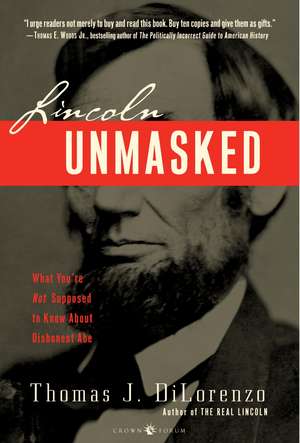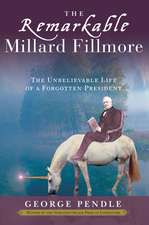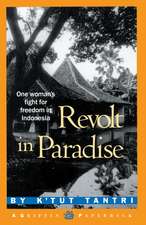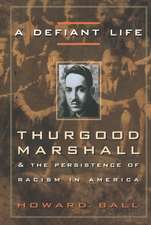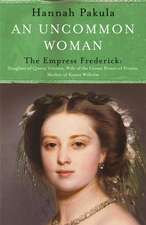Lincoln Unmasked: What You're Not Supposed to Know about Dishonest Abe
Autor Thomas J. Dilorenzoen Limba Engleză Paperback – 31 oct 2007
You should.
Thomas J. DiLorenzo, who ignited a fierce debate about Lincoln’s legacy with his book The Real Lincoln, now presents a litany of stunning new revelations that explode the most enduring (and pernicious) myths about our sixteenth president. Marshaling an astonishing amount of new evidence, Lincoln Unmasked offers an alarming portrait of a political manipulator and opportunist who bears little resemblance to the heroic, stoic, and principled figure of mainstream history.
Did you know that Lincoln . . .
• did NOT save the union? In fact, Lincoln did more than any other individual to destroy the voluntary union the Founding Fathers recognized.
• did NOT want to free the slaves? Lincoln, who did not believe in equality of the races, wanted the Constitution to make slavery “irrevocable.”
• was NOT a champion of the Constitution? Contrary to his high-minded rhetoric, Lincoln repeatedly trampled on the Constitution—and even issued an arrest warrant for the chief justice of the United States!
• was NOT a great statesman? Lincoln was actually a warmonger who manipulated his own people into a civil war.
• did NOT utter many of his most admired quotations? DiLorenzo exposes a legion of statements that have been falsely attributed to Lincoln for generations—usually to enhance his image.
In addition to detailing Lincoln’s offenses against the principles of freedom, equality, and states’ rights, Lincoln Unmasked exposes the vast network of academics, historians, politicians, and other “gatekeepers” who have sanitized his true beliefs and willfully distorted his legacy. DiLorenzo reveals how the deification of Lincoln reflects a not-so-hidden agenda to expand the size and scope of the American state far beyond what the Founding Fathers envisioned—an expansion that Lincoln himself began.
The hagiographers have shaped Lincoln’s image to the point that it has become more fiction than fact. With Lincoln Unmasked, DiLorenzo shows us an Abraham Lincoln without the rhetoric, lies, and political bias that have clouded a disastrous president’s enduring damage to the nation.
From the Hardcover edition.
Preț: 99.53 lei
Nou
Puncte Express: 149
Preț estimativ în valută:
19.04€ • 19.94$ • 15.76£
19.04€ • 19.94$ • 15.76£
Carte disponibilă
Livrare economică 17-31 martie
Preluare comenzi: 021 569.72.76
Specificații
ISBN-13: 9780307338426
ISBN-10: 0307338428
Pagini: 223
Dimensiuni: 142 x 208 x 12 mm
Greutate: 0.19 kg
Editura: Three Rivers Press (CA)
ISBN-10: 0307338428
Pagini: 223
Dimensiuni: 142 x 208 x 12 mm
Greutate: 0.19 kg
Editura: Three Rivers Press (CA)
Notă biografică
Thomas J. DiLorenzo is the author of The Real Lincoln and How Capitalism Saved America. A professor of economics at Loyola College in Maryland and a senior fellow at the Ludwig von Mises Institute, he has written for the Wall Street Journal, USA Today, the Washington Post, Reader’s Digest, Barron’s, and many other publications. He lives in Baltimore, Maryland.
From the Hardcover edition.
From the Hardcover edition.
Extras
1
Challenging the Gatekeepers
When President Reagan nominated Professor Mel Bradford of the University of Dallas to head the National Endowment for the Humanities in 1981, a group of intellectuals with influence in the administration waged a fierce campaign against the nomination. Their chief complaint was: “He’s anti-Lincoln!” Professor Bradford, an expert in the use of rhetoric, had dared to criticize some of Lincoln’s deceptive political language in peer-reviewed academic journal articles.1 Professor Bradford’s opponents apparently considered this blasphemous and conducted a vicious political campaign against him. They stooped so low as to spread false rumors that he was a Hitler admirer.2 Professor Bradford (who passed away in 1993) eventually withdrew his name in disgust. His opponents prevailed; there would be no challenge to the popular view of Abraham Lincoln.
Things have not changed much in the academic world since the Bradford affair. I have been subjected to similar calumny and name-calling, as has anyone else who attempts to deviate from the Official Truth. Lincoln has been portrayed as a saint, and his defenders are so sanctimonious that they consider themselves to be self-appointed Gatekeepers of the Truth. They do whatever is necessary to keep unflattering information about Lincoln from the public. If they do dare to mention such facts, they spin their statements to mislead, misinform, and confuse the reader. One has to wonder: What purpose does all this deception and misinformation serve? If Lincoln was such a saint, why can’t his record speak for itself?
The gatekeepers constitute what I call the Lincoln cult. It is mostly composed of academics who have spent their careers carrying on the deification of Abraham Lincoln that began with the New England clergy (and the Republican Party) of the late nineteenth century. As a rule, they ignore unpleasant facts about Lincoln, such as his suspension of habeas corpus, his imprisonment of tens of thousands of Northern political opponents during the War between the States, his shutting down of hundreds of opposition newspapers, his micromanagement of the bombing of Southern cities and the waging of war on civilians, his pledge to support a constitutional amendment prohibiting the federal government from ever interfering with Southern slavery, and his lifelong white supremacist views. If they do mention such things at all, it is only to make voluminous excuses for them or to denounce others who address them in their writing.3
According to Webster’s College Dictionary, a cult is “a group that devotes itself to or venerates a person, ideal, fad, etc.” or “a religion or sect considered to be false, unorthodox, or extremist.”
The Lincoln cult is interested not so much in research and education about Lincoln and the war—about discovering historical truth—but in maintaining a largely false image of the man whom they call “Father Abraham” and compare to Jesus and Moses. The rest of the academic world engages in vigorous debate and discussion of myriad issues every day; that’s what academic freedom is supposed to be all about. But when it comes to the subject of Lincoln, no such debate is permitted by the gatekeepers. There have been heated debates over the legacies of all other presidents, be it Jefferson, Jackson, Wilson, Teddy Roosevelt, FDR, Truman, Reagan, or Clinton, but no such debate is acceptable regarding Lincoln. One has to wonder: What are the gatekeepers afraid of?
The so-called Lincoln scholars’ decidedly nonscholarly behavior is motivated primarily by academic self-interest. The academic gatekeepers are paid very well in their academic jobs, and through government and foundation grants as well. They do very well financially on the lecture circuit and use university and foundation funds to give each other “Lincoln Awards” for their scholarship that are sometimes worth tens of thousands of dollars. Any challenges to their views are seen not only as challenges to the Official View of American History, but also to their overblown professional reputations and bank accounts.
Many Lincoln cultists behave in the manner they do because it serves a political agenda as well as a personal one. Left-wing Lincoln cultists run the gamut from mainstream liberals to democratic socialists to hard-core leftists like Eric Foner of Columbia University, who lamented the demise of the Soviet Union. (In a 1991 article in The Nation magazine Foner opined that, unlike Mikhail Gorbachev, Lincoln would not have allowed the former Soviet republics to secede peacefully from the Soviet Union.4) They are nationalists, like Lincoln, in that they favor a more powerful and more highly centralized (i.e., monopolistic) form of government that can better expand the welfare state, regulate the economy, or adopt socialism.
Right-wing Lincoln cultists such as Harry Jaffa and many of his fellow “Straussians” (followers of the late Leo Strauss of the University of Chicago) are also nationalists, like Lincoln, because they believe that a more powerful and highly centralized government will serve their political agenda of a more aggressive and imperialistic foreign policy. Indeed, in my 2002 debate with Jaffa, sponsored by the Independent Institute of Oakland, California, he declared at one point that 9/11 proved more than ever that “we need a strong central government.” It was not just a coincidence that he made this declaration in the context of a debate over Lincoln’s legacy.
Thus, one thing that all Lincoln cultists have in common is that they use the Lincoln mythology to advocate a bigger, more centralized, and more interventionist central government for one reason or another.
But the Lincoln “gate” is beginning to rust, which is apparently causing panic among the gatekeepers, who are not at all used to having their ideas challenged. In recent years Charles Adams published When in the Course of Human Events: Arguing the Case for Southern Secession and it sold very well, as did my own book, The Real Lincoln. Jeffrey Hummel’s Emancipating Slaves, Enslaving Free Men is another hard-hitting and influential challenge to the Lincoln cult, as is John Remington Graham’s A Constitutional History of Secession. Professor Clyde Wilson’s book From Union to Empire contains dozens of brilliant essays that challenge many of the superstitions and half-truths that are the intellectual currency of the Lincoln cult. The 1930s-era classic Lincoln the Man, by Edgar Lee Masters, Clarence Darrow’s law partner, was recently republished by the Foundation for American Education. (It was the most critical account of Lincoln to be published in the first half of the twentieth century.) The South Was Right! by James and Walter Kennedy has sold more than 100,000 copies, according to the authors. Secession, State, and Liberty, edited by David Gordon and published by Transaction Publishers, contains essays by twelve scholars who all write favorably of the right of secession in a free society; most of them excoriate Lincoln for waging the bloodiest war in history just to deny that such a right existed. And Thomas Woods’s New York Times bestseller, The Politically Incorrect Guide to American History, cites many of the preceding authors to arrive at conclusions such as, “States had the right to secede” in 1861; “The War between the States was not launched to free the slaves”; and “Lincoln believed that whites were superior and favored the deportation of freed slaves.”
Perhaps even more important is the Internet, which allows scholars to present ideas to the entire world without having to be filtered by gatekeepers of any kind.5
Lincoln Unmasked is another book that will make the gatekeepers very unhappy, for it uncovers important details about America’s sixteenth president that the Lincoln cult has effectively swept under the rug—until now. The book grew out of my continued interest in the Lincoln legacy after the publication of The Real Lincoln. In the years since I wrote that book I have continued to research the issue and discovered entirely new subjects and perspectives on Lincoln, which are presented here for the first time.
The book is divided into three sections: “What You’re Not Supposed to Know About Lincoln and His War”; “Economic Issues You’re Supposed to Ignore”; and “The Politics of the Lincoln Cult.” The first section, Chapters 2 through 10, explores a number of historically important issues that most Americans seem totally unaware of, thanks to the efforts of the gatekeepers.
Chapter 2 runs through “the Lincoln myths”—the most fundamental misconceptions about our sixteenth president.
Chapter 3 reveals that a host of familiar “Lincoln quotes” are, in fact, fake—Lincoln never said them. Academic researchers have exposed the truth that the Lincoln cult wants to obscure. The point is, not only have whole sections of Lincoln’s record been expunged from history, but other sections have been fabricated.
Chapters 4 and 5 expose how historians have rewritten antebellum history to portray—falsely—the North as benevolent and benighted, and to demonize the South. In war, the victors get to rewrite the history. Scholars are finally correcting the record. Drawing partly on the work of Brown University historian Joanne Pope Melish, Chapter 4 details how slavery existed in the North for some two hundred years, finally ending in the late 1850s. Thus, nineteenth-century “Yankees” were never quite as morally superior as they made themselves out to be. And as Chapter 5 reveals, Lincoln himself, for his entire adult life, advocated the deportation (his own word) of blacks to Africa, Haiti, Central and South America, and elsewhere. In fact, he held a White House meeting to encourage a group of free black men to “lead by example” and leave the country, moving to Liberia.
There was much more Northern opposition to Lincoln and his war than most Americans know of. Chapter 6 discusses the fiery attacks on Lincoln and his administration by the famous Massachusetts abolitionist Lysander Spooner. Spooner, among the most prominent and active of all the New England abolitionists, believed that the North fought the war to consolidate political power for the benefit of Northern industrialists. He believed—even years after the war—that the issue of slavery was cynically used as a mere political smoke screen.
Generations of Americans have been miseducated about “states’ rights,” and federalism as well, by being told the false tale that the states’ rights doctrine was only an excuse for slavery. The truth, as Chapter 7 shows, is that Thomas Jefferson and James Madison were among the foremost proponents of states’ rights, and for reasons that had nothing to do with slavery. Moreover, the states’ rights doctrine was embraced by the citizens of all states, north and south, until 1865. Indeed, some northern states invoked the doctrine to “nullify” the federal government’s Fugitive Slave Act in the years prior to the war.
Chapter 8 uncovers one of the most important negative consequences of the war: the death of states’ rights and, particularly, of the founding fathers’ notion of “divided sovereignty.” This idea, which is often associated with James Madison, was that the federal government could not be trusted to be the arbiter of what limits would be placed on its own powers. The citizens of the free and independent states, as sovereigns, were to have that role under the original Constitution. This ended in 1865, after which the federal government, through the Supreme Court, would decide what limits would be placed on its own powers. Not surprisingly, it has decided that there are, in essence, no limits at all, just as the founders warned. Throughout the twentieth century all the worst tyrants in the world would attack the idea of states’ rights and divided sovereignty and champion the cause of consolidated or centralized government.
Chapter 9 explains how Lincoln drove this transformation in American government by asserting the ahistorical argument that the citizens of the states were never sovereign, and that the Constitution was somehow adopted by “the whole people” of the nation. In reality, “the whole people” had nothing at all to do with the adoption of the Constitution.
Chapter 10 tells the story of how, when confronted with an opinion by the chief justice of the United States, Roger B. Taney—that Lincoln’s suspension of the writ of habeas corpus was illegal—the president issued an arrest warrant for the judge. The Lincoln cult has disputed the accuracy of this story in the past, but this chapter presents several new, unimpeachable sources that prove it to be true. Lincoln essentially destroyed the separation of powers during his administration by intimidating federal judges—and not just Taney—in this way.
If there is anything that causes the Lincoln cult to become agitated, if not hysterical, it is the suggestion that Abraham Lincoln, like virtually all other politicians in world history, was acutely interested in the accumulation of money and power. The fact is, he was, as Part II of the book demonstrates. For most of his adult life, before jumping to the Republicans, Lincoln was a member of the Whig Party—the party of the moneyed elite in America. He was a wealthy trial lawyer who married into an affluent, slave-owning Kentucky family, the Todds. As a prominent railroad industry attorney he was a consummate political insider in Northern big business circles.
The Lincoln cult has effectively covered up the truth about Lincoln’s and the Republican Party’s economic policies. Chapter 11 shows how Lincoln’s Republican Party used the powers of the central government to benefit its corporate supporters, usually at the expense of the general public. Lincoln himself was what today would be called a “lobbyist” for the railroad industry, as discussed in Chapter 12. He was also an ardent protectionist who spent his entire political career promoting protectionist tariffs, as shown in Chapter 13, and an “inflationist” who favored letting a federal bank print paper money that was not necessarily redeemable in gold or silver, as demonstrated in Chapter 14. Both the Whig and Republican parties used tariffs and paper money to subsidize corporations engaged in “internal improvements” projects.
Part III—“The Politics of the Lincoln Cult”—describes how the cult uses the Lincoln legacy to promote imperialistic, if not totalitarian, policies in today’s world. Advocates of an American empire that would wage “perpetual war for perpetual peace,” to borrow a phrase from Gore Vidal, hope to use the Lincoln legend to encourage America’s youth to participate in such adventures, as discussed in Chapter 15. Chapter 16 reveals how today’s enemies of civil liberties take as their model Lincoln’s suspension of civil liberties in the North for the duration of his administration.
Even the Pledge of Allegiance is something that has much less to do with expressing love for one’s country than more or less blind obedience to the consolidated, centralized state that was created in the aftermath of the War between the States. Most Americans will be surprised to learn in Chapter 17 that the Pledge was authored in 1892 by an avowed socialist named Francis Bellamy who wanted to use it to indoctrinate schoolchildren into the ideology of big government. The founding fathers would have been appalled by such a thing and would likely have rebelled against it.
The Lincoln cult has even used Lincoln’s record of imprisoning some of the congressional opposition, such as Congressman Clement L. Vallandigham of Ohio, who was deported in 1863, as evidence that such a practice might well be acceptable today. This sordid story is told in Chapter 18.
The nineteenth and final chapter begins with a survey of some recent books by prominent authors who have seriously challenged the Official View of American History that is presented by the Lincoln cult. Among these authors are New York Times editorial writer Steven R. Weisman, University of Virginia historian Michael F. Holt, liberal writer Michael Lind, and former U.S. Navy Secretary and novelist James Webb.
Are the gatekeepers losing their influence at last? We can only hope so.
From the Hardcover edition.
Challenging the Gatekeepers
When President Reagan nominated Professor Mel Bradford of the University of Dallas to head the National Endowment for the Humanities in 1981, a group of intellectuals with influence in the administration waged a fierce campaign against the nomination. Their chief complaint was: “He’s anti-Lincoln!” Professor Bradford, an expert in the use of rhetoric, had dared to criticize some of Lincoln’s deceptive political language in peer-reviewed academic journal articles.1 Professor Bradford’s opponents apparently considered this blasphemous and conducted a vicious political campaign against him. They stooped so low as to spread false rumors that he was a Hitler admirer.2 Professor Bradford (who passed away in 1993) eventually withdrew his name in disgust. His opponents prevailed; there would be no challenge to the popular view of Abraham Lincoln.
Things have not changed much in the academic world since the Bradford affair. I have been subjected to similar calumny and name-calling, as has anyone else who attempts to deviate from the Official Truth. Lincoln has been portrayed as a saint, and his defenders are so sanctimonious that they consider themselves to be self-appointed Gatekeepers of the Truth. They do whatever is necessary to keep unflattering information about Lincoln from the public. If they do dare to mention such facts, they spin their statements to mislead, misinform, and confuse the reader. One has to wonder: What purpose does all this deception and misinformation serve? If Lincoln was such a saint, why can’t his record speak for itself?
The gatekeepers constitute what I call the Lincoln cult. It is mostly composed of academics who have spent their careers carrying on the deification of Abraham Lincoln that began with the New England clergy (and the Republican Party) of the late nineteenth century. As a rule, they ignore unpleasant facts about Lincoln, such as his suspension of habeas corpus, his imprisonment of tens of thousands of Northern political opponents during the War between the States, his shutting down of hundreds of opposition newspapers, his micromanagement of the bombing of Southern cities and the waging of war on civilians, his pledge to support a constitutional amendment prohibiting the federal government from ever interfering with Southern slavery, and his lifelong white supremacist views. If they do mention such things at all, it is only to make voluminous excuses for them or to denounce others who address them in their writing.3
According to Webster’s College Dictionary, a cult is “a group that devotes itself to or venerates a person, ideal, fad, etc.” or “a religion or sect considered to be false, unorthodox, or extremist.”
The Lincoln cult is interested not so much in research and education about Lincoln and the war—about discovering historical truth—but in maintaining a largely false image of the man whom they call “Father Abraham” and compare to Jesus and Moses. The rest of the academic world engages in vigorous debate and discussion of myriad issues every day; that’s what academic freedom is supposed to be all about. But when it comes to the subject of Lincoln, no such debate is permitted by the gatekeepers. There have been heated debates over the legacies of all other presidents, be it Jefferson, Jackson, Wilson, Teddy Roosevelt, FDR, Truman, Reagan, or Clinton, but no such debate is acceptable regarding Lincoln. One has to wonder: What are the gatekeepers afraid of?
The so-called Lincoln scholars’ decidedly nonscholarly behavior is motivated primarily by academic self-interest. The academic gatekeepers are paid very well in their academic jobs, and through government and foundation grants as well. They do very well financially on the lecture circuit and use university and foundation funds to give each other “Lincoln Awards” for their scholarship that are sometimes worth tens of thousands of dollars. Any challenges to their views are seen not only as challenges to the Official View of American History, but also to their overblown professional reputations and bank accounts.
Many Lincoln cultists behave in the manner they do because it serves a political agenda as well as a personal one. Left-wing Lincoln cultists run the gamut from mainstream liberals to democratic socialists to hard-core leftists like Eric Foner of Columbia University, who lamented the demise of the Soviet Union. (In a 1991 article in The Nation magazine Foner opined that, unlike Mikhail Gorbachev, Lincoln would not have allowed the former Soviet republics to secede peacefully from the Soviet Union.4) They are nationalists, like Lincoln, in that they favor a more powerful and more highly centralized (i.e., monopolistic) form of government that can better expand the welfare state, regulate the economy, or adopt socialism.
Right-wing Lincoln cultists such as Harry Jaffa and many of his fellow “Straussians” (followers of the late Leo Strauss of the University of Chicago) are also nationalists, like Lincoln, because they believe that a more powerful and highly centralized government will serve their political agenda of a more aggressive and imperialistic foreign policy. Indeed, in my 2002 debate with Jaffa, sponsored by the Independent Institute of Oakland, California, he declared at one point that 9/11 proved more than ever that “we need a strong central government.” It was not just a coincidence that he made this declaration in the context of a debate over Lincoln’s legacy.
Thus, one thing that all Lincoln cultists have in common is that they use the Lincoln mythology to advocate a bigger, more centralized, and more interventionist central government for one reason or another.
But the Lincoln “gate” is beginning to rust, which is apparently causing panic among the gatekeepers, who are not at all used to having their ideas challenged. In recent years Charles Adams published When in the Course of Human Events: Arguing the Case for Southern Secession and it sold very well, as did my own book, The Real Lincoln. Jeffrey Hummel’s Emancipating Slaves, Enslaving Free Men is another hard-hitting and influential challenge to the Lincoln cult, as is John Remington Graham’s A Constitutional History of Secession. Professor Clyde Wilson’s book From Union to Empire contains dozens of brilliant essays that challenge many of the superstitions and half-truths that are the intellectual currency of the Lincoln cult. The 1930s-era classic Lincoln the Man, by Edgar Lee Masters, Clarence Darrow’s law partner, was recently republished by the Foundation for American Education. (It was the most critical account of Lincoln to be published in the first half of the twentieth century.) The South Was Right! by James and Walter Kennedy has sold more than 100,000 copies, according to the authors. Secession, State, and Liberty, edited by David Gordon and published by Transaction Publishers, contains essays by twelve scholars who all write favorably of the right of secession in a free society; most of them excoriate Lincoln for waging the bloodiest war in history just to deny that such a right existed. And Thomas Woods’s New York Times bestseller, The Politically Incorrect Guide to American History, cites many of the preceding authors to arrive at conclusions such as, “States had the right to secede” in 1861; “The War between the States was not launched to free the slaves”; and “Lincoln believed that whites were superior and favored the deportation of freed slaves.”
Perhaps even more important is the Internet, which allows scholars to present ideas to the entire world without having to be filtered by gatekeepers of any kind.5
Lincoln Unmasked is another book that will make the gatekeepers very unhappy, for it uncovers important details about America’s sixteenth president that the Lincoln cult has effectively swept under the rug—until now. The book grew out of my continued interest in the Lincoln legacy after the publication of The Real Lincoln. In the years since I wrote that book I have continued to research the issue and discovered entirely new subjects and perspectives on Lincoln, which are presented here for the first time.
The book is divided into three sections: “What You’re Not Supposed to Know About Lincoln and His War”; “Economic Issues You’re Supposed to Ignore”; and “The Politics of the Lincoln Cult.” The first section, Chapters 2 through 10, explores a number of historically important issues that most Americans seem totally unaware of, thanks to the efforts of the gatekeepers.
Chapter 2 runs through “the Lincoln myths”—the most fundamental misconceptions about our sixteenth president.
Chapter 3 reveals that a host of familiar “Lincoln quotes” are, in fact, fake—Lincoln never said them. Academic researchers have exposed the truth that the Lincoln cult wants to obscure. The point is, not only have whole sections of Lincoln’s record been expunged from history, but other sections have been fabricated.
Chapters 4 and 5 expose how historians have rewritten antebellum history to portray—falsely—the North as benevolent and benighted, and to demonize the South. In war, the victors get to rewrite the history. Scholars are finally correcting the record. Drawing partly on the work of Brown University historian Joanne Pope Melish, Chapter 4 details how slavery existed in the North for some two hundred years, finally ending in the late 1850s. Thus, nineteenth-century “Yankees” were never quite as morally superior as they made themselves out to be. And as Chapter 5 reveals, Lincoln himself, for his entire adult life, advocated the deportation (his own word) of blacks to Africa, Haiti, Central and South America, and elsewhere. In fact, he held a White House meeting to encourage a group of free black men to “lead by example” and leave the country, moving to Liberia.
There was much more Northern opposition to Lincoln and his war than most Americans know of. Chapter 6 discusses the fiery attacks on Lincoln and his administration by the famous Massachusetts abolitionist Lysander Spooner. Spooner, among the most prominent and active of all the New England abolitionists, believed that the North fought the war to consolidate political power for the benefit of Northern industrialists. He believed—even years after the war—that the issue of slavery was cynically used as a mere political smoke screen.
Generations of Americans have been miseducated about “states’ rights,” and federalism as well, by being told the false tale that the states’ rights doctrine was only an excuse for slavery. The truth, as Chapter 7 shows, is that Thomas Jefferson and James Madison were among the foremost proponents of states’ rights, and for reasons that had nothing to do with slavery. Moreover, the states’ rights doctrine was embraced by the citizens of all states, north and south, until 1865. Indeed, some northern states invoked the doctrine to “nullify” the federal government’s Fugitive Slave Act in the years prior to the war.
Chapter 8 uncovers one of the most important negative consequences of the war: the death of states’ rights and, particularly, of the founding fathers’ notion of “divided sovereignty.” This idea, which is often associated with James Madison, was that the federal government could not be trusted to be the arbiter of what limits would be placed on its own powers. The citizens of the free and independent states, as sovereigns, were to have that role under the original Constitution. This ended in 1865, after which the federal government, through the Supreme Court, would decide what limits would be placed on its own powers. Not surprisingly, it has decided that there are, in essence, no limits at all, just as the founders warned. Throughout the twentieth century all the worst tyrants in the world would attack the idea of states’ rights and divided sovereignty and champion the cause of consolidated or centralized government.
Chapter 9 explains how Lincoln drove this transformation in American government by asserting the ahistorical argument that the citizens of the states were never sovereign, and that the Constitution was somehow adopted by “the whole people” of the nation. In reality, “the whole people” had nothing at all to do with the adoption of the Constitution.
Chapter 10 tells the story of how, when confronted with an opinion by the chief justice of the United States, Roger B. Taney—that Lincoln’s suspension of the writ of habeas corpus was illegal—the president issued an arrest warrant for the judge. The Lincoln cult has disputed the accuracy of this story in the past, but this chapter presents several new, unimpeachable sources that prove it to be true. Lincoln essentially destroyed the separation of powers during his administration by intimidating federal judges—and not just Taney—in this way.
If there is anything that causes the Lincoln cult to become agitated, if not hysterical, it is the suggestion that Abraham Lincoln, like virtually all other politicians in world history, was acutely interested in the accumulation of money and power. The fact is, he was, as Part II of the book demonstrates. For most of his adult life, before jumping to the Republicans, Lincoln was a member of the Whig Party—the party of the moneyed elite in America. He was a wealthy trial lawyer who married into an affluent, slave-owning Kentucky family, the Todds. As a prominent railroad industry attorney he was a consummate political insider in Northern big business circles.
The Lincoln cult has effectively covered up the truth about Lincoln’s and the Republican Party’s economic policies. Chapter 11 shows how Lincoln’s Republican Party used the powers of the central government to benefit its corporate supporters, usually at the expense of the general public. Lincoln himself was what today would be called a “lobbyist” for the railroad industry, as discussed in Chapter 12. He was also an ardent protectionist who spent his entire political career promoting protectionist tariffs, as shown in Chapter 13, and an “inflationist” who favored letting a federal bank print paper money that was not necessarily redeemable in gold or silver, as demonstrated in Chapter 14. Both the Whig and Republican parties used tariffs and paper money to subsidize corporations engaged in “internal improvements” projects.
Part III—“The Politics of the Lincoln Cult”—describes how the cult uses the Lincoln legacy to promote imperialistic, if not totalitarian, policies in today’s world. Advocates of an American empire that would wage “perpetual war for perpetual peace,” to borrow a phrase from Gore Vidal, hope to use the Lincoln legend to encourage America’s youth to participate in such adventures, as discussed in Chapter 15. Chapter 16 reveals how today’s enemies of civil liberties take as their model Lincoln’s suspension of civil liberties in the North for the duration of his administration.
Even the Pledge of Allegiance is something that has much less to do with expressing love for one’s country than more or less blind obedience to the consolidated, centralized state that was created in the aftermath of the War between the States. Most Americans will be surprised to learn in Chapter 17 that the Pledge was authored in 1892 by an avowed socialist named Francis Bellamy who wanted to use it to indoctrinate schoolchildren into the ideology of big government. The founding fathers would have been appalled by such a thing and would likely have rebelled against it.
The Lincoln cult has even used Lincoln’s record of imprisoning some of the congressional opposition, such as Congressman Clement L. Vallandigham of Ohio, who was deported in 1863, as evidence that such a practice might well be acceptable today. This sordid story is told in Chapter 18.
The nineteenth and final chapter begins with a survey of some recent books by prominent authors who have seriously challenged the Official View of American History that is presented by the Lincoln cult. Among these authors are New York Times editorial writer Steven R. Weisman, University of Virginia historian Michael F. Holt, liberal writer Michael Lind, and former U.S. Navy Secretary and novelist James Webb.
Are the gatekeepers losing their influence at last? We can only hope so.
From the Hardcover edition.
Recenzii
“Lincoln Unmasked is a masterpiece response to the crowd that DiLorenzo calls the Lincoln cult. He names names, and names places, in what is a fascinating read and correction to one of the most important episodes in U.S. history.” —Walter E. Williams, nationally syndicated columnist and John M. Olin Professor of Economics at George Mason University
“Abe, climb down from Mt. Rushmore, and vacate the penny. Your days in the pantheon are over, thanks to the scholarship and courage of Thomas J. DiLorenzo.” —Llewellyn H. Rockwell, Jr., president of the Ludwig von Mises Institute
“In The Real Lincoln, Professor DiLorenzo convincingly exposed Lincoln idolatry as a fraud that has poisoned America’s understanding of itself. Following up in Lincoln Unmasked, he shows who maintains and profits from the toxin in the body politic and the damage that they are doing to us to this very day. DiLorenzo’s masterful diagnosis, we may hope, will go a long way toward a cure.” —Clyde Wilson, Distinguished Professor Emeritus of History, University of South Carolina
“Lincoln Unmasked is a masterful book. Finally, Lincoln has been held to account and the lies and machinations of the Lincoln cult exposed.” —Paul Craig Roberts, syndicated columnist and former Assistant Secretary of the U.S. Treasury
“Brilliant and withering, Lincoln Unmasked answers the kind of forbidden questions that our country now more than ever needs to hear. Thomas DiLorenzo deals in the kind of information that is consistently withheld from students in what we laughingly call our educational system.” —Thomas E. Woods, Jr., bestselling author of The Politically Incorrect Guide to American History
From the Hardcover edition.
“Abe, climb down from Mt. Rushmore, and vacate the penny. Your days in the pantheon are over, thanks to the scholarship and courage of Thomas J. DiLorenzo.” —Llewellyn H. Rockwell, Jr., president of the Ludwig von Mises Institute
“In The Real Lincoln, Professor DiLorenzo convincingly exposed Lincoln idolatry as a fraud that has poisoned America’s understanding of itself. Following up in Lincoln Unmasked, he shows who maintains and profits from the toxin in the body politic and the damage that they are doing to us to this very day. DiLorenzo’s masterful diagnosis, we may hope, will go a long way toward a cure.” —Clyde Wilson, Distinguished Professor Emeritus of History, University of South Carolina
“Lincoln Unmasked is a masterful book. Finally, Lincoln has been held to account and the lies and machinations of the Lincoln cult exposed.” —Paul Craig Roberts, syndicated columnist and former Assistant Secretary of the U.S. Treasury
“Brilliant and withering, Lincoln Unmasked answers the kind of forbidden questions that our country now more than ever needs to hear. Thomas DiLorenzo deals in the kind of information that is consistently withheld from students in what we laughingly call our educational system.” —Thomas E. Woods, Jr., bestselling author of The Politically Incorrect Guide to American History
From the Hardcover edition.
